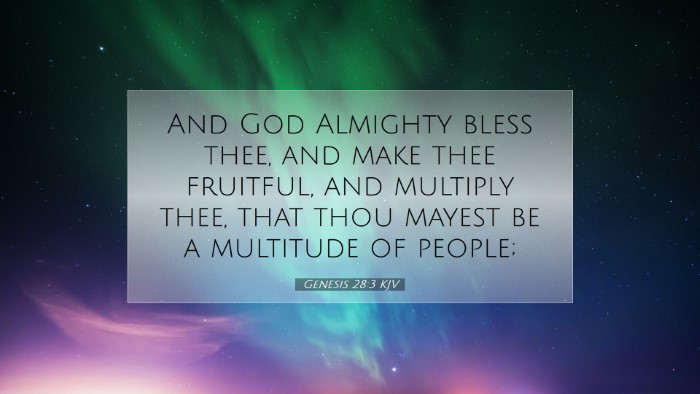Commentary on Genesis 28:3
Genesis 28:3 (KJV): "And God Almighty bless thee, and make thee fruitful, and multiply thee, that thou mayest be a multitude of people."
Introduction
The verse Genesis 28:3 is a significant pronouncement made by Isaac to his son Jacob. It continues the theme of God's promises related to the Abrahamic covenant, emphasizing blessing, fruitfulness, and multiplication. In this commentary, we explore various insights from public domain commentaries, aiming to uncover theological and practical applications for pastoral ministry, scholarly interpretation, and personal edification.
Historical Context
During the time of this blessing, Jacob is preparing to leave Canaan for Haran, influenced by the tension between him and his brother Esau. Isaac, aware of the divine promise established with Abraham, seeks to reinforce the covenantal blessings on Jacob, highlighting the continuity of God's work through generations.
Insights from Matthew Henry
Matthew Henry emphasizes the gravity of the blessing Isaac imparts to Jacob, noting that it is not merely a paternal wish, but a prophetic declaration under divine inspiration. He articulates that the term "God Almighty" reflects God's omnipotence, suggesting that the blessings conveyed are grounded in God's sovereign will.
- Divine Authority: The blessings are conferred by God's authority, underlining God's ability to fulfill promises.
- Fruitfulness and Multiplication: Henry interprets these terms as both physical (in terms of descendants) and spiritual (in terms of covenantal fruition). This illustrates the comprehensive nature of God's blessings upon His people.
- A Multitude of People: This indicates the global reach of the Abrahamic covenant, pointing toward the future fulfillment through Christ, who embodies the ultimate blessing to all nations (Genesis 12:3).
Insights from Albert Barnes
Albert Barnes provides a detailed analysis of the theological implications in this blessing. He notes that the invocation of "God Almighty" highlights God's sufficiency and omnipotence that Jacob will need in his journey, especially as he leaves the land of promise.
- Covenant Promise: Barnes argues that the blessing reaffirms Jacob's role in the Abrahamic covenant, making a direct connection to the covenantal relationship established with Abraham and continued through Isaac.
- Promise of Fruitfulness: He elaborates that fruitfulness signifies not just physical progeny but also spiritual legacy, prompting believers to consider the impact of our spiritual lineage.
- Multiplication of People: Barnes connects this to the idea of God's kingdom expanding through the ages, emphasizing the necessity of faithful discipleship.
Insights from Adam Clarke
Adam Clarke's exposition provides a rich linguistic and cultural examination of the terms used in this blessing. He notes that the Hebrew terms imply both abundance and prosperity.
- Linguistic Nuance: Clarke points out that the word "bless" carries with it a deep sense of empowering, suggesting that Isaac’s blessing instills divine ability to thrive.
- Generational Continuity: The call to be "fruitful" and "multiply" echoes the creation mandate (Genesis 1:28), reflecting God's original design for humanity. Clarke underscores the importance of generational faithfulness in fulfilling God’s purposes.
- Promise of a Multitude: This promise reflects not just immediate family growth but also the broader implications of community in faith — a foreshadowing of the Israelite nation formed through Jacob’s lineage.
Theological Reflection
The central themes of Genesis 28:3 revolve around God's faithful fulfillment of His promises. This invokes several theological reflections:
- God's Sovereignty: The declared blessings affirm that God's plans will prevail despite human frailties and conflicts.
- Faith and Obedience: Jacob’s journey into the unknown serves as a model for faith, reflecting the believer's call to trust in God's provision and guidance.
- Multiplication and Mission: The idea that Jacob will become a multitude speaks to the missional aspect of God's people, reminding us that we are called to extend the blessings of faith to others.
Practical Applications
For pastors, students, and theologians, Genesis 28:3 serves as a reminder of several practical dimensions:
- Empowerment in Ministry: Just as Isaac invoked the power of God over Jacob, pastoral leaders can invoke God's blessings as they lead their congregations, highlighting reliance on God's might.
- Cultivating Generational Faith: Encourage the next generation in faith, recognizing that blessings and responsibilities are passed down. Mentorship and discipleship are key in this process.
- Engagement in Missional Living: Reflect on our roles as part of the larger community of believers tasked with spreading the Gospel and making disciples, fulfilling Christ’s great commission.
Conclusion
Genesis 28:3 presents a profound insight into the covenantal blessings of God, encompassing themes of authority, promise, and mission. The insights from Matthew Henry, Albert Barnes, and Adam Clarke collectively enrich our understanding, conveying that God's plans for His people are grounded in His sovereign purpose. As believers, we are called to recognize and participate in the unfolding of God's divine narrative, grounded in prayer, faith, and action.


